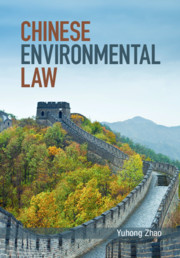Book contents
- Chinese Environmental Law
- Chinese Environmental Law
- Copyright page
- Contents
- Detailed Contents
- Tables
- Preface
- Author’s Note
- Weights and Measures
- Statutes
- Regulations and Measures
- Judicial Interpretations
- State Plans and Party Policies
- Table of Cases
- Table of Treaties
- Abbreviations
- Abbreviations of Legal Instruments
- 1 Environmental Problems and Legal Responses
- 2 Key Institutions of Environmental Protection
- 3 The Environmental Protection Law
- 4 Environmental Impact Assessment
- 5 Regulation and Control of Air Pollution
- 6 Regulation and Control of Water Pollution
- 7 Waste Management
- 8 Soil Contamination
- 9 Environmental Tort
- 10 Judicial Review
- 11 Environmental Crimes
- 12 Environmental Public Interest Litigation
- Bibliography
- Index
10 - Judicial Review
Published online by Cambridge University Press: 16 June 2021
- Chinese Environmental Law
- Chinese Environmental Law
- Copyright page
- Contents
- Detailed Contents
- Tables
- Preface
- Author’s Note
- Weights and Measures
- Statutes
- Regulations and Measures
- Judicial Interpretations
- State Plans and Party Policies
- Table of Cases
- Table of Treaties
- Abbreviations
- Abbreviations of Legal Instruments
- 1 Environmental Problems and Legal Responses
- 2 Key Institutions of Environmental Protection
- 3 The Environmental Protection Law
- 4 Environmental Impact Assessment
- 5 Regulation and Control of Air Pollution
- 6 Regulation and Control of Water Pollution
- 7 Waste Management
- 8 Soil Contamination
- 9 Environmental Tort
- 10 Judicial Review
- 11 Environmental Crimes
- 12 Environmental Public Interest Litigation
- Bibliography
- Index
Summary
Chapter 10 studies judicial review, widely known as administrative litigation in China, under the Administrative Litigation Law (ALL) (2017), which was first enacted in 1989. The command-and-control approach to pollution control grants wide-ranging powers to administrative agencies. They set standards, monitor performance and impose sanctions. Their acts or omissions directly determine the effectiveness of the environmental legal regime. Judicial review allows courts to check agency behavior to ensure good governance in pollution control and long-term sustainable development. While ALL (1989) has laid down the legal basis for injured parties to sue against unlawful agency acts or omissions, there have been tremendous obstacles for private parties to gain access to courts. The Law was amended in 2014 and 2017 to relax the statutory requirement on standing and expand the scope of judicial review. The chapter examines the issue of standing, the scope of judicial review, and judicial remedies. It concludes with discussion of the special challenges of administrative litigation in China.
- Type
- Chapter
- Information
- Chinese Environmental Law , pp. 337 - 359Publisher: Cambridge University PressPrint publication year: 2021

